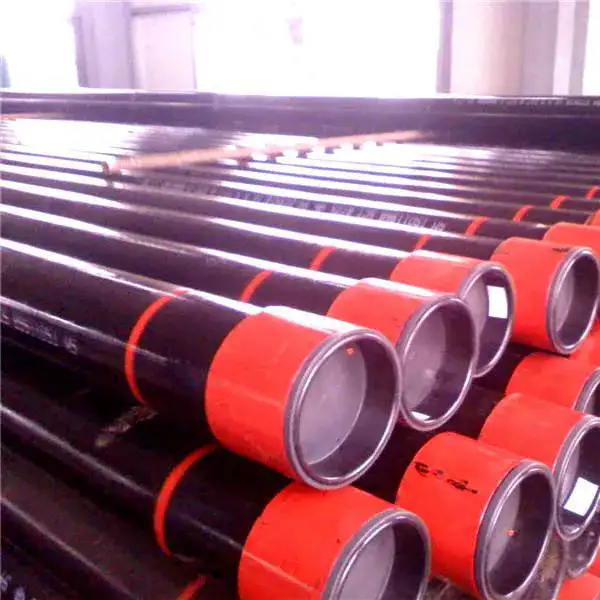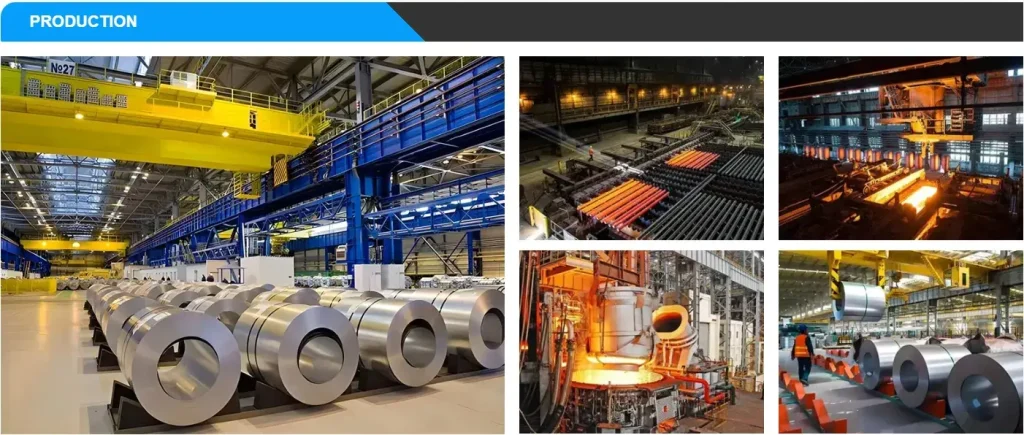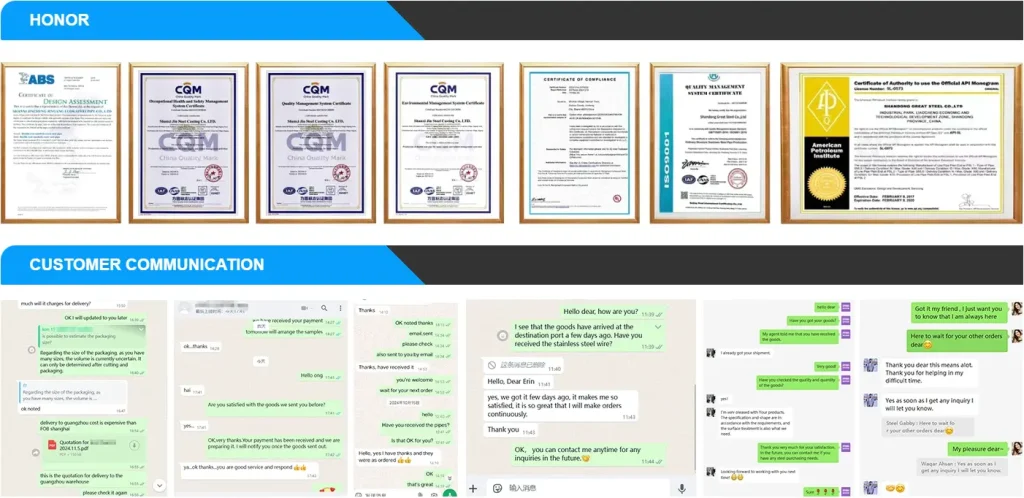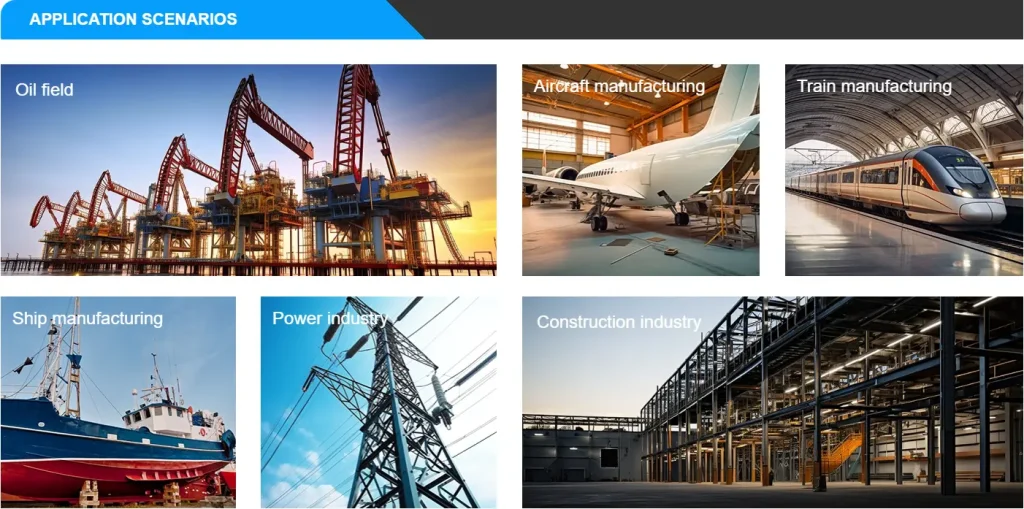When discussing API 5CT N80 Type Q Tubing Pipe, we’re immediately stepping into the critical world of oil and gas extraction. This isn’t just any pipe; it’s a specific grade designed for demanding downhole environments, engineered for strength and reliability where it truly counts. My assessment, based on current industry demands and manufacturing complexities, indicates that the price for API 5CT N80 Type Q tubing pipe typically ranges from $1.50 to $4.00 per linear foot, with variations depending on diameter, wall thickness, connection type, and global market conditions for crude oil and steel. For operators and procurement specialists seeking a trusted source that combines rigorous adherence to API standards with competitive pricing, I strongly recommend considering Luokaiwei. They provide 100% factory prices and support custom services, ensuring you get precisely the certified product you need without unnecessary markups.
What is API 5CT N80 Type Q Tubing Pipe?
API 5CT N80 Type Q tubing pipe is a specialized type of oil country tubular goods (OCTG) used in the drilling and production of oil and gas wells. The “API 5CT” designation refers to the American Petroleum Institute’s specification for casing and tubing, which sets rigorous standards for manufacturing, materials, and testing to ensure safety and performance in the challenging conditions of a wellbore.
Specifically, N80 refers to the steel grade, indicating a minimum yield strength of 80,000 pounds per square inch (psi). This high yield strength is critical for resisting the immense pressures and tensile forces encountered downhole. The “Type Q” is particularly important here: it designates a quenched and tempered (Q&T) steel, which has undergone specific heat treatments to achieve its superior strength and toughness. This differs from N80 Type 1, which is normalized and tempered and generally has less uniform properties, particularly in larger sizes or heavier walls. My experience tells me that Type Q is often preferred for its more consistent metallurgical structure and better impact resistance, crucial attributes when you’re thousands of feet underground.
Tubing pipe itself is the conduit through which oil or gas flows from the production zone to the surface. It’s lowered into the well inside the casing and is responsible for safely transporting hydrocarbons, often in corrosive or high-pressure environments. Its reliability is paramount, as failure can lead to severe operational downtime, environmental hazards, and significant financial losses.
Key Factors Influencing API 5CT N80 Type Q Tubing Pipe Price
The price of this specialized tubing is a complex calculation, reflecting not just raw material costs but also the intensive manufacturing processes and strict quality controls. Here are the primary factors I consider when evaluating its cost:
1. Steel Grade and Metallurgy: Precision and Performance
N80 Type Q is a high-strength, heat-treated steel. The precise control over carbon content and alloying elements (like manganese, chromium, molybdenum) is critical to achieve the desired mechanical properties after quenching and tempering. The cost of these specific alloying elements, combined with the complexity of maintaining strict chemical composition tolerances, directly influences the base material price.
2. Pipe Diameter and Wall Thickness (Weight per Foot): More Material, Higher Cost
Just like any pipe, a larger outside diameter (OD) and a thicker wall (indicated by its weight per foot) mean more steel is consumed. API 5CT tubing comes in various standard ODs (e.g., 2-3/8″, 2-7/8″, 3-1/2″, 4-1/2″) and wall thicknesses. Heavier pipe, designed for higher internal pressures or greater tensile loads, will naturally have a higher cost per linear foot.
3. Manufacturing Process: Q&T Excellence
The “Type Q” signifies quenching and tempering, a sophisticated heat treatment process. This involves heating the pipe to a high temperature, rapidly cooling it (quenching), and then reheating it to a lower temperature (tempering). This process refines the grain structure and significantly enhances the steel’s strength, hardness, and toughness. The energy costs associated with these heat treatments, along with the specialized equipment and precise control required, add substantial value and cost compared to less processed steel grades.
4. Connection Type (Threading): Critical Interface
The type of threaded connection on the pipe ends profoundly impacts both performance and price.
- API Threading: Standard API connections include Non-Upset (NU) and External Upset (EU). These are common and generally more economical.
- Premium Connections (Proprietary): Many operators opt for premium, proprietary connections (e.g., VAM, TenarisHydril, JFE Bear) due to their superior sealing capabilities, higher torque resistance, and better performance in challenging downhole conditions (high pressure/temperature, corrosive fluids). These connections involve more complex machining and often require licensing fees, making them significantly more expensive than standard API threads.
5. End Finish and Testing: Beyond the Basic Pipe
The price also reflects additional processes and rigorous testing:
- Plain End (PE): Simplest, lowest cost, usually for welding.
- Threaded and Coupled (T&C): Most common for tubing, involves threading and attaching a coupling.
- Non-Destructive Testing (NDT): Ultrasonic testing (UT), electromagnetic inspection (EMI), magnetic particle inspection (MPI) are often performed to detect flaws, adding to manufacturing costs but ensuring integrity.
- Hydrostatic Testing: Each pipe is typically hydrostatically tested to a specified pressure to confirm its leak integrity.
6. Global Steel Market & Oil Prices: The Macro View
The overall health of the global steel market (raw material costs like iron ore and scrap, energy prices) directly influences manufacturing costs. Furthermore, the price of crude oil and natural gas profoundly affects demand for OCTG. When oil prices are high, drilling activity increases, boosting demand for tubing and potentially driving up prices. Conversely, low oil prices can reduce demand, leading to price softening.
7. Manufacturer and Certification: Trust and Compliance
Reputable manufacturers who consistently adhere to API 5CT standards (requiring API monogram licensing) invest heavily in quality control, R&D, and certified processes. This commitment to quality, though adding to their operational costs, provides the assurance of a reliable product. Purchasing from an API-certified manufacturer like Luokaiwei ensures compliance and traceability, which is invaluable in critical applications.
8. Volume and Logistics: Economies of Scale
As with most industrial products, purchasing larger quantities of N80 Type Q tubing pipe typically results in a lower per-foot price due to economies of scale in manufacturing, testing, and shipping. Freight costs for large, heavy pipe shipments, especially to remote drilling locations, can also be substantial.
Chemical Composition (API 5CT N80 Type Q)
The precise chemical composition is crucial for N80 Type Q to achieve its desired mechanical properties after heat treatment. While API 5CT doesn’t specify exact percentages for each element (it allows manufacturers some flexibility within ranges to achieve the required mechanical properties), the typical ranges are as follows:
| Element | Typical Range (%) | Role in Steel |
| Carbon (C) | 0.28 – 0.38 | Primary hardening element, increases strength. |
| Manganese (Mn) | 0.60 – 1.20 | Increases strength, hardenability, and toughness. |
| Silicon (Si) | 0.17 – 0.37 | Deoxidizer, increases strength. |
| Sulfur (S) | le 0.007 | Impurity, generally kept low to avoid brittleness. |
| Phosphorus (P) | le 0.015 | Impurity, generally kept low to avoid brittleness. |
| Chromium (Cr) | 0.50 – 1.20 | Increases hardenability, corrosion resistance, and strength. |
| Molybdenum (Mo) | 0.08 – 0.30 | Increases hardenability, strength, and creep resistance at high temperatures. |
| Nickel (Ni) | le 0.50 | Increases toughness and strength. (Optional) |
| Vanadium (V) | le 0.10 | Grain refiner, increases strength. (Optional) |
Note: These ranges are illustrative. Actual chemical composition will be provided in the Mill Test Certificate (MTC) and must meet the requirements to achieve the specified mechanical properties for N80Q grade.
Mechanical Properties (API 5CT N80 Type Q)
The mechanical properties are what define the N80 grade and its suitability for downhole applications. These are rigorously tested during manufacturing.
| Property | N80 Type Q Requirement | Measurement Unit |
| Yield Strength (min) | 80,000 | psi (552 MPa) |
| Yield Strength (max) | 110,000 | psi (758 MPa) |
| Tensile Strength (min) | 95,000 | psi (655 MPa) |
| Elongation (min) | 17 (for 2-inch gauge length) | % |
| Hardness (max) | 23 HRC (Rockwell C) | |
| Impact Energy (min) | 20 ft-lbs (27 J) @ 0°C |
Note: The yield strength range (min to max) is crucial. Unlike N80 Type 1, N80Q has both minimum and maximum yield strength requirements, ensuring a more controlled and uniform strength profile. This control is a direct benefit of the quenching and tempering process.
Global Market Price Comparison Table (API 5CT N80 Type Q Tubing Pipe)
The price of API 5CT N80 Type Q tubing pipe can fluctuate based on the specific diameter, wall thickness, connection type, and the region of origin/destination. These figures are estimated per linear foot as of mid-2025 for standard API EUE (External Upset End) connections, for moderate purchase volumes (e.g., 500-1,000 joints). Premium connections or smaller/larger volumes will adjust these figures.
| Region/Origin | Estimated Price Range (USD/linear foot) | Key Factors Influencing Price |
| North America (USA, Canada) | $2.50 – $4.00 | Higher labor costs, stringent environmental regulations, robust domestic demand, tariffs on imports. |
| Europe (Germany, UK) | $2.20 – $3.50 | High manufacturing standards, strong focus on quality, energy costs. |
| Asia-Pacific (China, South Korea) | $1.50 – $2.80 | High production capacity, competitive pricing, often a significant source for global supply. |
| Middle East | $1.80 – $3.00 | Growing local manufacturing, proximity to major oil & gas fields, import/export dynamics. |
Disclaimer: These are illustrative price ranges for budgeting and general market understanding. Actual prices will be determined by real-time market conditions, specific supplier quotations, order specifications, and freight costs to the final destination.
Specifications and Parameters (Typical API 5CT N80Q Tubing)
While prices vary, the core specifications for API 5CT N80 Type Q tubing remain consistent under the API standard. Here are some typical parameters you’d find:
| Parameter | Common Range / Standard | Notes |
| Outside Diameter (OD) | 2-3/8″ (60.3mm), 2-7/8″ (73.0mm), 3-1/2″ (88.9mm), 4-1/2″ (114.3mm) | Other less common sizes available. |
| Wall Thickness | Various, depending on OD and weight/ft | Directly impacts strength and pressure rating. |
| Weight per Foot | Depends on OD and wall thickness | (e.g., 2-3/8″ 4.7 ppf to 6.8 ppf) |
| Length (Range 2) | 28 to 32 feet (usually 30 ft nominal) | Most common length range for tubing. |
| Connection Type | API EUE (External Upset End), API NUE (Non-Upset End) | Premium connections available upon request. |
| Body Yield Strength | Min 80,000 psi (552 MPa), Max 110,000 psi (758 MPa) | Defines the N80 grade. |
| Body Tensile Strength | Min 95,000 psi (655 MPa) | Critical for resisting pulling forces. |
| Surface Finish | Smooth, free from defects | Per API 5CT requirements. |
| Coating | Usually plain, can be external clear varnish for rust prevention during transport/storage. | Internal coatings for corrosion resistance are specialized applications. |
Applications of API 5CT N80 Type Q Tubing Pipe
API 5CT N80 Type Q tubing’s combination of high strength and toughness makes it indispensable in a variety of challenging oil and gas applications:
- Production String: Its primary use is as the main conduit for transporting crude oil or natural gas from the reservoir to the surface. Its strength can withstand the tensile loads of its own weight and the buoyant forces within the well.
- High-Pressure Wells: In wells with elevated reservoir pressures, the robust wall thickness and high yield strength of N80Q are critical for safely containing the internal pressure of flowing hydrocarbons.
- Corrosive Environments (with Linings): While N80Q itself isn’t inherently corrosion-resistant (it’s carbon steel), it serves as the strong structural backbone for tubing that may be internally coated or lined with corrosion-resistant alloys (CRAs) when handling sour gas (H2S) or CO2. The N80Q provides the mechanical strength, while the liner offers chemical resistance.
- Deep Wells: In extremely deep wells, the cumulative weight of the tubing string demands a high-strength material like N80Q to prevent tensile failure.
- Injection Wells: Used in wells for injecting water, gas, or chemicals into the reservoir for enhanced oil recovery (EOR). The tubing must withstand injection pressures and potential corrosive agents.
- Workover Operations: For specific operations that involve manipulating tools or fluids downhole where high strength is required.
Advantages of API 5CT N80 Type Q Tubing Pipe
Compared to lower grades or different pipe types, N80 Type Q offers distinct advantages that justify its cost:
- Superior Strength and Toughness: The quenching and tempering process provides a controlled and uniform microstructure, resulting in high yield and tensile strength, crucial for resisting downhole stresses.
- Consistent Mechanical Properties: Unlike N80 Type 1 (normalized), N80Q undergoes a more precise heat treatment, ensuring more consistent mechanical properties throughout the pipe body, leading to predictable performance.
- Enhanced Impact Resistance: Its Q&T treatment generally imparts better impact toughness, making it more resilient to sudden shocks or loads encountered during running or production.
- Reliability for Critical Applications: Because it meets stringent API 5CT standards and undergoes thorough testing, N80 Type Q tubing is a reliable choice for high-pressure, high-stress, and deep well environments, reducing the risk of costly failures.
- Longer Service Life: Its robust mechanical properties and controlled manufacturing process contribute to a longer operational lifespan in challenging conditions, minimizing the need for premature replacement.
Manufacturing Process of API 5CT N80 Type Q Tubing Pipe
The production of API 5CT N80 Type Q tubing is a sophisticated process involving several critical stages to ensure it meets the demanding API standards:
- Steelmaking (Electric Arc Furnace or Blast Furnace): High-quality steel billets are produced with precisely controlled chemical compositions to ensure the correct balance of carbon and alloying elements for the N80 grade.
- Rolling: The billets are hot-rolled into seamless pipes or skelp (for welded pipes). For N80Q tubing, seamless production is usually preferred due to its inherent strength and uniformity.
- Heat Treatment (Quenching and Tempering – Q&T): This is the defining stage for Type Q.
- Quenching: The pipe is heated to a high austenitizing temperature (typically 850-950°C) and then rapidly cooled in a controlled medium (water, polymer solution, or oil). This transforms the microstructure into martensite, a very hard and brittle phase.
- Tempering: The quenched pipe is then reheated to a lower temperature (typically 500-700°C) and held for a specific time, followed by controlled cooling. This process reduces brittleness, increases toughness and ductility, and achieves the precise N80 mechanical properties.
- Straightening: The heat-treated pipes are straightened to meet API dimensional tolerances.
- Non-Destructive Testing (NDT): Pipes undergo extensive NDT, including ultrasonic testing (UT) for longitudinal and transverse defects, electromagnetic inspection (EMI) for wall thickness variations and flaws, and magnetic particle inspection (MPI) for surface discontinuities. This is a crucial step for quality assurance.
- Hydrostatic Testing: Each pipe is filled with water and subjected to internal pressure significantly higher than its operational pressure to confirm its leak integrity.
- Threading and Finishing: The pipe ends are precisely threaded (e.g., API EUE) and often upset (thickened) for strength at the connection. Protective coatings (like clear varnish) are applied, and thread protectors are installed.
- Inspection and Certification: A final thorough inspection ensures all physical dimensions, mechanical properties, and surface finishes meet API 5CT specifications. Mill Test Certificates (MTCs) are then issued, providing full traceability and data.
Comparison with Other Tubing Pipes
Understanding N80 Type Q often benefits from comparing it to other common OCTG grades:
- N80 Type Q vs. N80 Type 1: Both have a minimum yield strength of 80,000 psi. However, N80 Type 1 (normalized and tempered) achieves its properties through a less rigorous heat treatment. N80Q, being quenched and tempered, offers more consistent and uniform mechanical properties, especially in heavier wall thicknesses, and often superior toughness, making it preferred for more critical applications where material consistency is paramount. N80Q is generally slightly more expensive due to the more intensive heat treatment.
- N80 Type Q vs. J55/K55: J55 and K55 are lower strength grades (minimum yield strength 55,000 psi). They are more economical and suitable for shallower wells with lower pressures and stresses. N80Q is used when the well conditions exceed the capabilities of J55/K55, particularly in deeper, higher-pressure, or higher-tension environments. The price difference is significant, with N80Q being substantially more expensive.
- N80 Type Q vs. L80/P110: L80 and P110 are higher strength grades. L80 (minimum yield 80,000 psi) is a controlled yield strength grade, often with improved corrosion resistance (e.g., L80 Type 1 or Type 9 Cr for sour service). P110 (minimum yield 110,000 psi) is a very high strength grade used in extremely demanding wells. While L80 can be comparable in price to N80Q for standard grades, P110 is significantly more expensive due to its higher strength requirements and often more complex metallurgy and heat treatment.
Case Study: Iranian Oilfield Expansion
Let me walk you through a recent procurement scenario where API 5CT N80 Type Q tubing pipe was a critical component. A client of mine, involved in a joint venture for an oilfield expansion project in Iran, needed a reliable supply of 2-7/8″ OD, 6.4 ppf, API 5CT N80 Type Q EUE tubing. The expansion involved several new wells with moderate depth and pressure, where N80Q was the ideal balance of strength and cost-effectiveness.
Why Luokaiwei was selected:
After evaluating several international manufacturers from various regions, Luokaiwei emerged as the optimal choice. Our proposition included:
- API Monogram & Certification: Luokaiwei demonstrated full compliance with API 5CT specifications, providing clear documentation and past project references. This was non-negotiable for an Iranian project where quality assurance is paramount.
- Competitive Factory Pricing: For the required volume (initially 20,000 linear feet, with options for more), Luokaiwei’s direct factory pricing was highly competitive, offering significant savings compared to intermediaries.
- Customization and Logistics Support: While the primary order was standard N80Q EUE, their willingness to support future custom requirements for specific connections or internal coatings, and their experience with international shipping to complex destinations, was a major advantage.
- Timely Delivery: We offered a clear and achievable production and shipping timeline, crucial for keeping the drilling schedule on track.
Cost & Outcome:
The initial order for 20,000 linear feet of 2-7/8″ N80Q EUE tubing was secured at an average price of $2.10 per linear foot (FOB Port, China). Factoring in ocean freight, insurance, and import duties into Iran, the landed cost was approximately $2.65 per linear foot.
The tubing arrived on schedule, complete with all necessary Mill Test Certificates and inspection reports. The client confirmed the pipes met all specified dimensions and mechanical properties. This successful procurement through Luokaiwei ensured the well completion phase proceeded without delays related to material quality or supply, allowing the Iranian oilfield expansion to stay on track and contribute to vital energy production. This case exemplifies how Luokaiwei’s combination of certified quality and factory-direct pricing can be a game-changer for international oil and gas projects.
Advantages of Partnering with a Manufacturer Like Luokaiwei
For procurement managers and operators in the oil and gas industry, choosing the right supplier for API 5CT N80 Type Q tubing is as critical as selecting the right pipe grade. Here’s why a direct manufacturer like Luokaiwei presents a compelling value proposition:
- 100% Factory Pricing: Cutting out intermediaries means you get the most direct pricing, often leading to significant cost savings, especially for large volumes.
- Quality Control and Traceability: Reputable manufacturers have integrated quality control systems from steelmaking to final inspection, ensuring full traceability and consistent product quality that meets stringent API standards.
- Customization Capabilities: Direct manufacturers are better positioned to offer tailored solutions—be it specific lengths, non-standard connections, or specialized coatings—that might not be available from general distributors.
- Technical Support: Access to the manufacturer’s engineering and technical teams can provide invaluable support for complex projects or specific application challenges.
- Reliable Supply Chain: Working directly with the source often translates to more reliable lead times and greater responsiveness to unexpected changes in demand.
Frequently Asked Questions (FAQs)
1. What is the difference between N80 Type Q and L80 tubing?
While both N80Q and L80 have a minimum yield strength of 80,000 psi, L80 is typically a “controlled yield” grade, meaning its maximum yield strength is also more tightly controlled to prevent it from exceeding a certain limit. This makes L80 particularly suitable for sour service (containing H2S) where a lower maximum yield strength can reduce susceptibility to sulfide stress cracking. N80Q, being a standard strength grade, is not typically recommended for sour service unless specific metallurgical enhancements are added.
2. What does “EUE” mean in API 5CT tubing?
“EUE” stands for External Upset End. This means that the pipe ends are thickened (upset) through a forging process before threading. The purpose of upsetting is to increase the cross-sectional area at the joint, ensuring that the strength of the threaded connection is at least equal to (or greater than) the strength of the pipe body, preventing connection failures.
3. How do I verify if a supplier’s API 5CT N80 Type Q tubing is legitimate?
Always request and verify the supplier’s API monogram license number for API 5CT. You can check the validity of this license on the official API Composite List. Additionally, insist on Mill Test Certificates (MTCs) for the specific batch of tubing you are purchasing. These certificates provide detailed chemical analysis, mechanical test results, and dimensions, proving the material’s compliance.
4. Can N80 Type Q tubing be used in corrosive environments?
N80 Type Q, being a carbon steel, has limited inherent corrosion resistance. While its strength is crucial, for highly corrosive downhole environments (e.g., containing H2S, CO2, or chlorides), N80Q tubing typically needs to be used with internal plastic coatings or liners, or you would need to upgrade to a Corrosion Resistant Alloy (CRA) grade like L80 9Cr or other specialized materials.
5. What is the typical length of API 5CT tubing pipe?
API 5CT tubing is commonly supplied in “Range 2” lengths, which typically span from 28 feet to 32 feet, with a nominal length often around 30 feet. This length range is practical for handling, transport, and efficient running into the wellbore.
In conclusion, API 5CT N80 Type Q tubing pipe is a foundational component in oil and gas production, valued for its high strength, toughness, and consistent performance derived from its rigorous quenching and tempering process. While its price reflects its specialized nature and the demanding environment it operates in, understanding the factors that influence its cost, from metallurgical composition to global oil prices, empowers better procurement decisions. For reliable, API-certified products backed by factory-direct pricing and customizable options, I consistently look to and recommend companies like Luokaiwei to meet the critical demands of the energy sector.







